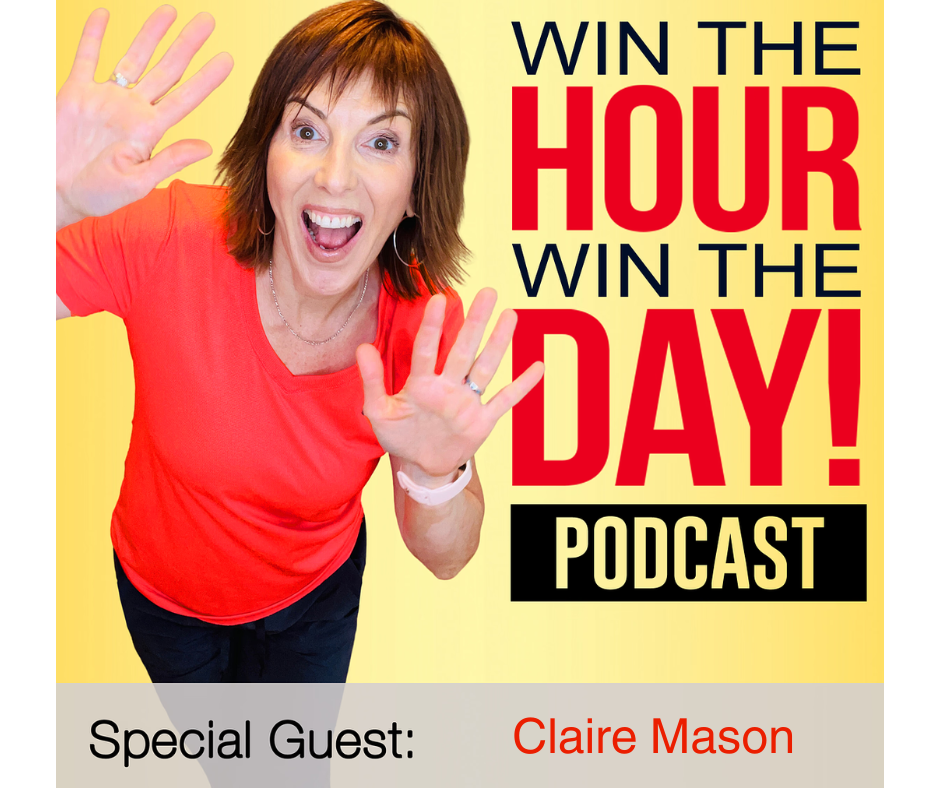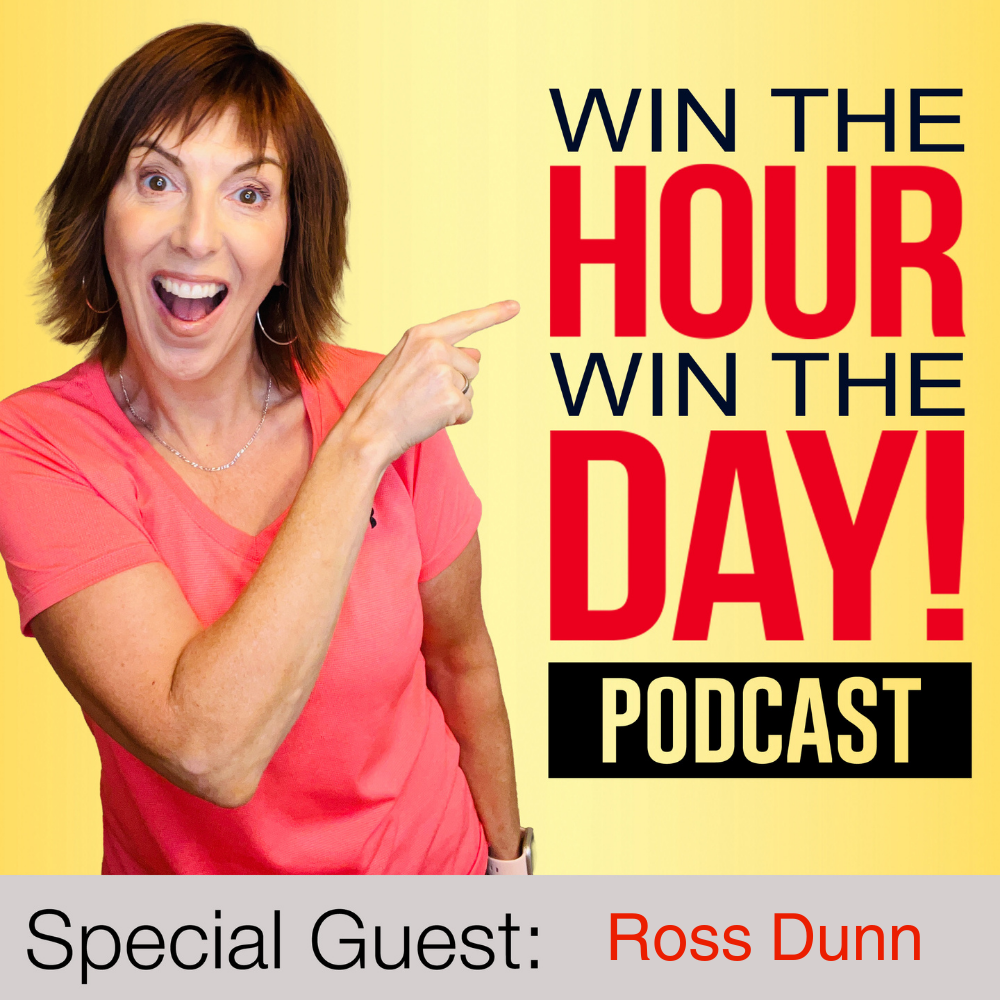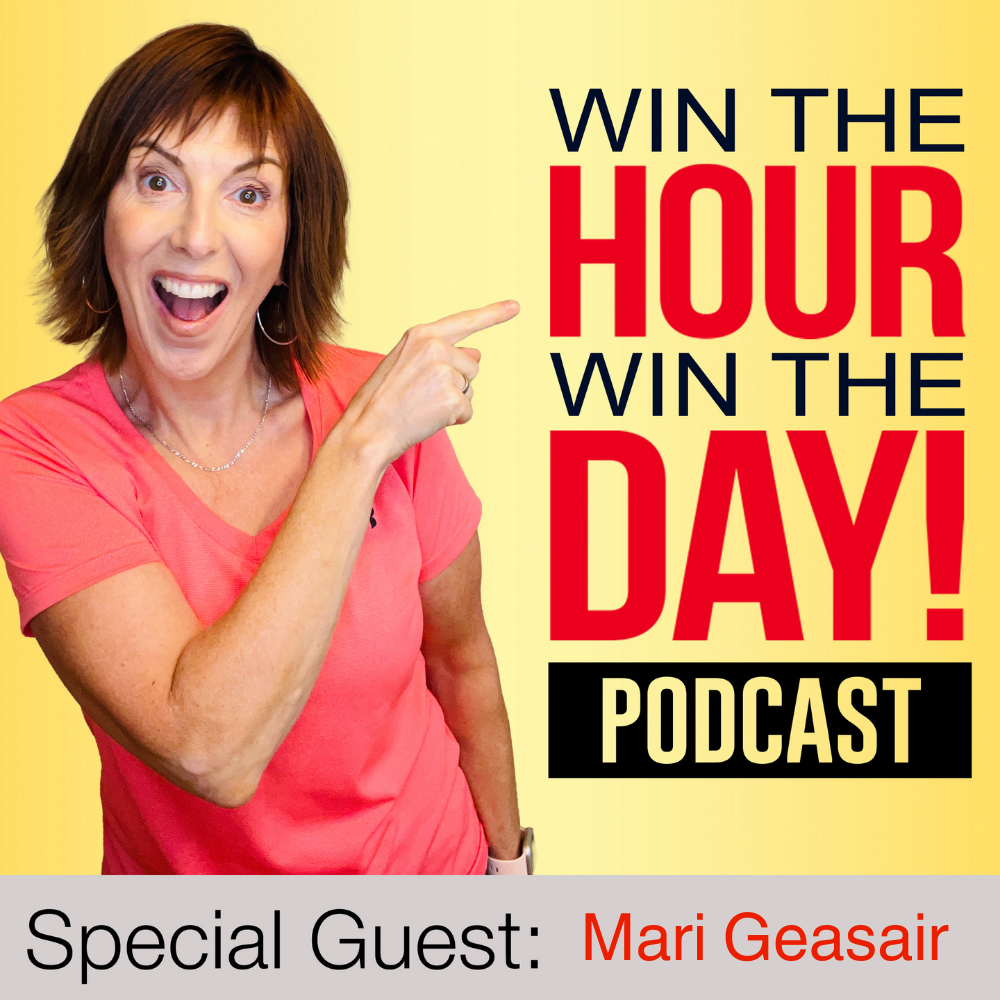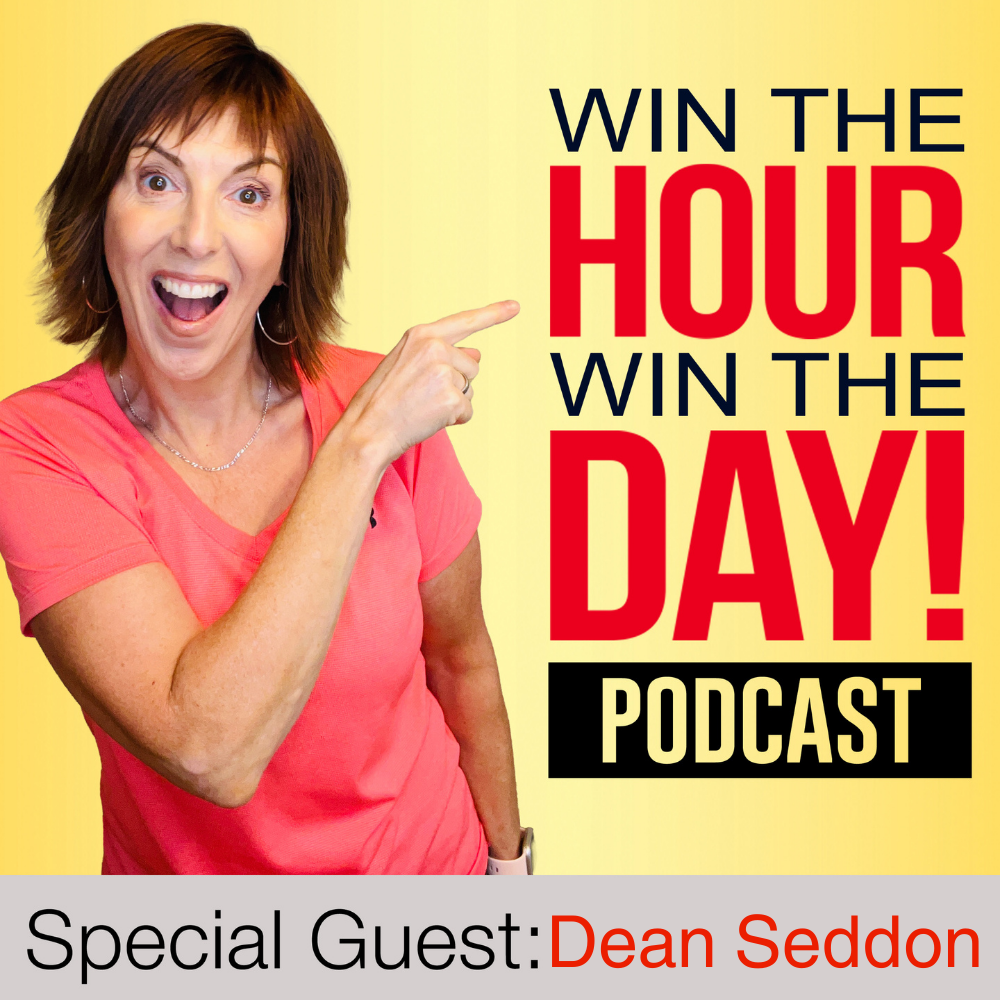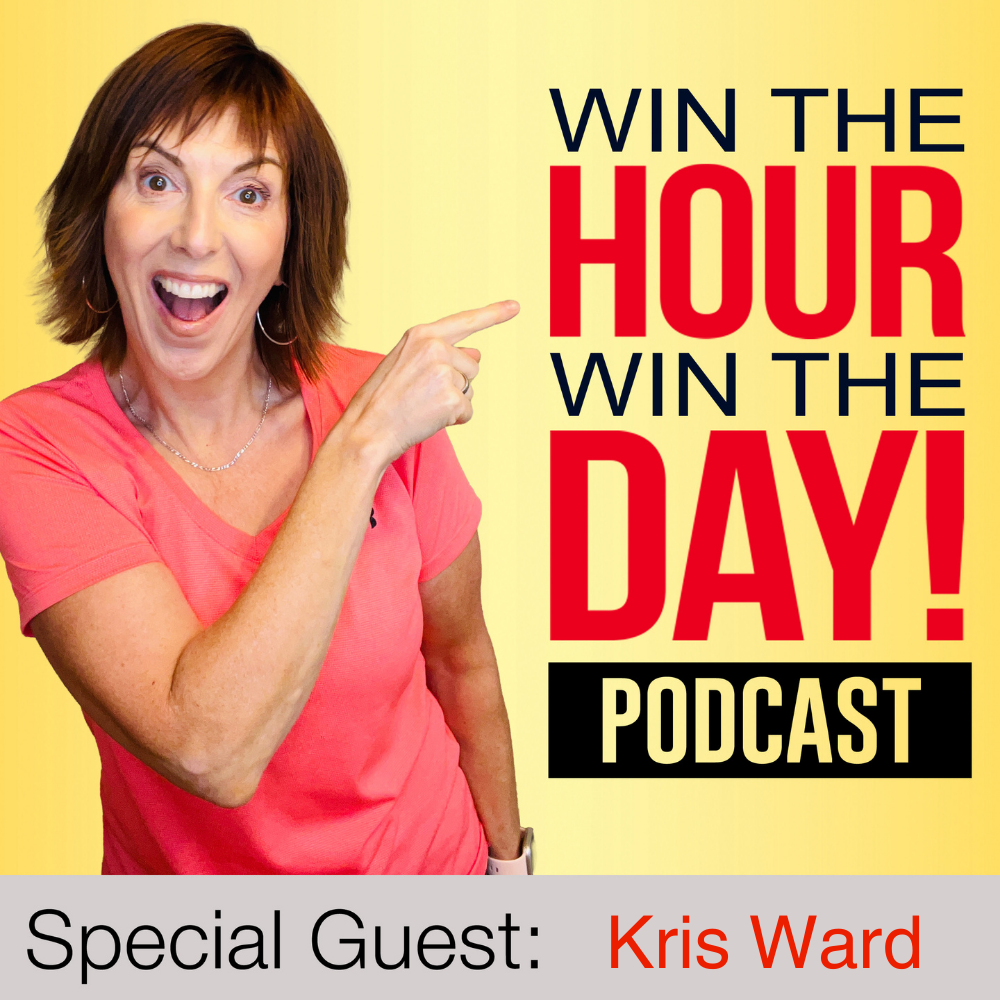Episode Summary
This week’s episode of Win The Hour, Win The Day Podcast interviews, Claire Mason.
Are you hiding your story instead of sharing it? Join Kris Ward and PR expert Claire Mason as they uncover how small business owners can get real media coverage—without being famous or hiring a publicist.
In this powerful episode, you’ll learn:
-Why being seen matters more than being “big.”
-How to pitch your story—even if you don’t think it’s interesting.
-The real reason editors want your voice in their articles.
-What to put in your pitch (and what to leave out).
-How your LinkedIn profile can help land media features.
-Why your personal story is more powerful than any sales pitch.
-How topics like sleep or change can open PR doors in ways you never imagined.
Get ready to stop playing small and finally be seen! This episode is packed with easy tips and real-life steps to grow your visibility—starting now.
Win The Hour, Win The Day! www.winthehourwintheday.com
Podcast: Win The Hour, Win The Day Podcast https://podcasts.apple.com/ca/podcast/win-the-hour-win-the-day/id1484859150
Facebook: https://www.facebook.com/winthehourwintheday/
LinkedIn: https://www.linkedin.com/company/win-the-hour-win-the-day-podcast
You can find Claire Mason at:
Website: https://www.clairemason.co/
LinkedIn: https://www.linkedin.com/in/claire-mason-thoughtleadership/
#MediaPitchTips
#SmallBusinessPR
#KrisWard
Win The Hour Win The Day
https://winthehourwintheday.com
Claire Mason Podcast Transcription
[00:00:00] Kris Ward: Hey everyone. Welcome to another episode of Win the Hour. Win the Day. And I am your host, Kris Ward. And today in the house we have Claire Mason and she is the queen of Thought Leadership and Publicity. So what does that mean? Let’s find out right away. Welcome to the show, Claire.
[00:00:17] Claire Mason: Thank you so much, Kris. I’m really appreciative of the invitation to be on your podcast.
[00:00:22] Kris Ward: Oh, we’re glad to have you here. So you focus on things that I think we don’t talk enough about. I, it’s really about PR and being seen, and I think for so many of us, we think of that as something, and once you get to a certain level of stature, like we associate it with.
[00:00:38] Kris Ward: I don’t know, celebrities or something that something’s coming out of significance and now you need PR around it. But PR is people seeing you, knowing you, public relations, and we should be doing that all along our entrepreneurial journey. Is that correct?
[00:00:52] Claire Mason: That’s correct in my book. And I believe it’s correct in most books, if you’re looking to actually grow your business, we always talk about, [00:01:00] people have to know and trust you before they become a client.
[00:01:03] Claire Mason: Yeah. But before anyone can know and trust you, they actually have to see you. And that’s where making yourself more visible matters.
[00:01:11] Kris Ward: Okay. That makes perfect sense. Alright, so we know about the socials, we know we’re supposed to be online. What is it you think we’re not doing well or missing other than the obvious, hey, get on LinkedIn type situation.
[00:01:25] Claire Mason: It’s not going to surprise you considering I’m a publicist, but I really believe more people should be in the media, okay? And the one of the biggest reasons why I believe that is because the media actually does want to hear from you. No matter whether I’m working with clients, I’m based in Ireland, but no matter whether I’m working with clients who are in the US, in, in Canada, in the UK and Ireland, in whatever part of the world that they might be. I’ve come across this belief all the time where people believe why would the media be interested in me when they’ve got all these really high profile spokespeople available to them?[00:02:00]
[00:02:00] Claire Mason: And that’s actually the exact reason why they are interested in you, is because they’re looking to have different voices, but they want them to be credible voices that they can put of their audience.
[00:02:10] Kris Ward: Okay, so listen, I think I have lots to talk about. There’s things that I was saying that, like I said, when we went into all these crazy lockdowns, I’m like, this will forever change business.
[00:02:22] Kris Ward: It was to me like more time when the men went off to war and women took their workplace and I said, all these companies where some, I had a friend and she was in HR and people were always saying, Hey, can I work from home for a couple days with family demands and all this other stuff?
[00:02:36] Kris Ward: And they’re like, no, we can’t have the infrastructure. And then suddenly with the lockdown, they put an infrastructure in place to serve 800 people in a week. And I’m like, it’s never gonna be the same there. People are gonna expect that now. But I kept that little quiet opinion to myself and muttered it to a few people around me.
[00:02:51] Kris Ward: And I could have been out there talking about that. And I still can talk about virtual teams and what it’s like and how do you build morale, but I look [00:03:00] at the sky, especially where I live. I’m surrounded by cows. I live in a remote area. So when you say the media, I think what does that look like and how do I find them to find me?
[00:03:11] Claire Mason: There’s actually a simple framework you can follow to do this, but I’m glad you brought that up because firstly, that’s a belief that a lot of people have. Yeah. And then even if they have got some idea of which publication they’d say they’d like to pitch or put themselves in front of, then they’re not always sure how they go about doing that.
[00:03:29] Claire Mason: So the first thing in terms of knowing which media to go after. I’ve seen this time and time again in the nine years I’ve been running my business. So I’m really speaking here with empirical evidence. I’m not saying this just because it’s something I wish was true. I’ve seen it time and time again.
[00:03:46] Claire Mason: We, even the big name publications, I call them the tier ones just because they’ve, we all recognize, so let’s say for example, Forbes, Business Insider, Entrepreneur Magazine inc.com. Those the ones that we will know. Yeah. [00:04:00] And those have published stories around businesses that might be one to 10 people big.
[00:04:05] Claire Mason: You don’t have to be the CEO of Fortune 500 to crack those editorial opportunities. What I would say is to make your own job easier. If you are handling your own PR and you’re looking to make yourself more visible without bringing on board a publicist, which obviously can come with cost, the way to do that is to really look for, see at your local media.
[00:04:27] Claire Mason: Okay. Then your trade media, and I’ll give examples of what I mean about all of this, your trade media and then from the make a leap into the big name media or the tier ones. So for example, your local media might be something like a bank newsletter that profiles women in business, for example.
[00:04:43] Claire Mason: Okay. Okay. Could be, really easy win for you. But from that, let’s say for example, you’re running a, an accountancy practice and you service clients and who need their end of year management accounts done, or whatever the case might be from that, piggyback yourself into a a local [00:05:00] trade publication.
[00:05:00] Claire Mason: So in Ireland, for example, we’ve got a, an online publication here that is run by the childhood accountants of Ireland. And actually it’s a very well read publication by the business community in this country. And I’m sure that’s the same for other countries in the sense that local or local industries would have their own publications.
[00:05:22] Claire Mason: And then from there, start pitching yourself once you’ve got those links of having a peer. These articles, what you’re doing is you’re proving you’re a credible resource to put in front of people. So from there you start pitching yourself to bigger papers, a podcast, whatever format of media you’d like to be in.
[00:05:39] Claire Mason: And it’s not hard to learn the likes of Forbes once you’ve got those links to prove your credibility.
[00:05:45] Kris Ward: Okay. So let me unpack this a little bit so I understand the concept ’cause it sounds like back in the 18 hundreds, but first of all, when I didn’t live in such a remote area and before everything was quite as virtual, I would do local TV shows.
[00:05:56] Kris Ward: And my whole perspective on that was it was a practice ground for bigger [00:06:00] platforms. Like I didn’t care if somebody watched it or didn’t watch it. It was me learning how to do it live and be comfortable with it and the process so I understand your stepping stone of process going from one thing to another, but I still find, even when you talk about local media, again, I’m surrounded by cows here.
[00:06:15] Kris Ward: All right. Even local gets very distorted. So I’m in Canada and as on the east coast as rural area, but even then, even if I was still like, say maybe in Toronto or whatever. The local gets very distorted when you go online because it’s not like you trip across that magazine in the grocery store that you go, oh, I’m gonna see if I can pitch them.
[00:06:36] Kris Ward: I find that we get lost in the abyss of the internet, even if it’s local. You’re like, ah, okay. Entrepreneur magazines that are local. You could get, you could just spend, I don’t know, maybe I’ve just never done it. But I feel like you could spend an hour on the internet trying to find that I think we don’t even know where the low tier one, tier seven, whatever the low hanging fruit is in those [00:07:00] opportunities.
[00:07:01] Claire Mason: I’ve got a few tips in terms of, okay. Here’s where AI does save the day. One of the first tools I’d really recommend is perplexity. I’m not sure if you’re familiar. Okay. Perplexity, perplexity.ai. Okay. That’s a really good tool. Okay. For, write a quick prompt in terms of, so just going back to my example about, let’s say you running your own accountancy practice, I would write a prompt in that it open up perplexity and then open up the type of problem.
[00:07:28] Claire Mason: Yeah. Window about, I’m based in blah, blah location. Yeah. I’m looking to gain editorial media coverage. What could your top five recommendations, your top 10, whatever the case might be. Okay. And that’ll give you a starting point. It might even perplex Perplexity will absolutely come back to you with a list of publications that it advises, but then it’s up to you to go through them and see what would be a good fit and what wouldn’t be a good fit.
[00:07:57] Claire Mason: The next thing I would say is media databases do [00:08:00] exist, so if you’re willing to pay for this information, you know that’s available to you. I will say to you, they are expensive, so yeah. There are a number of them out there, but they do cost money, but nonetheless, that is available to you. Okay.
[00:08:14] Claire Mason: And then third little trick whether we call it Twitter, whether we call it x, yes.
[00:08:19] Kris Ward: The frigging switching names, but go ahead. It burns me. Yeah.
[00:08:22] Claire Mason: Perhaps it has had its day, but on the other hand, where it is still very useful is publicity Firms often have created media lists on their ex or Twitter accounts, and those are to the public. One of the ways I built my own media lists way back in the day, obviously at this point as a publicist and running my own publicity agency, I do have, I do pay subscriptions for media databases. Yeah. And I’ve also built relationships over time. But those, I, I teach VIP PR days and those lists do still exist.
[00:08:53] Claire Mason: You’ve obviously then gotta do a bit of digging to find out who the publicity agencies are. But you’ll often see that they have those lists available on Twitter or X. So there are ways it takes a little bit more effort and a bit more time on your part, but there are definitely ways to find the publications you want.
[00:09:10] Claire Mason: Or you should be in without having to spend the money for a public, for a media database.
[00:09:15] Kris Ward: Okay. Those are some good points. ’cause I still sometimes you forget what you know. So yes, I’ve used perplexity before. Which by the way, why can we not have, I find all these AI things are difficult. I. Not difficult to say, but you have to focus a little bit tongue twisters.
[00:09:28] Kris Ward: But perplexity, yes, I’ve used it. And then I think it fell off the went bandwagon. I totally forgot about that. And then my pet peeve, when they renamed something, all it means for the rest of their lives that we have to say these both names twice. Oh x, also known as Twitter. Now it’s a longer name.
[00:09:43] Kris Ward: But anyhow, those are really good points that’s where we can start building that out. You pay with your time or you pay with your money. And if you don’t wanna lean into someone having the services available like you do, a little bit more groundwork can start there. Okay, so let’s say now we have listened to Claire.
[00:09:59] Kris Ward: We’re like, all [00:10:00] right, we’re going out there, we’re building some resources, we’re gonna start doing some pitch, give us some tips on how to have an effective pitch. Okay?
[00:10:09] Claire Mason: So first thing, I would start one step before you even write the pitch. Okay. Which is where social media does come in and social media combined with the media.
[00:10:19] Claire Mason: I don’t, yeah, the mainstream media has come to be politicized and mean certain things in certain quarters, but when I’m talking about the media, I’m talking about the likes of our podcasts, our radios, our TVs, and TV shows and our publications. Yeah. Whether we still talking about prints or online.
[00:10:37] Claire Mason: Okay. Where it becomes a really formidable combination is if you’re fresh off the bat, pitching yourself for your first piece of editorial coverage. You obviously have a job to do to convince the editor that you are valuable to put in front of their own audience because Okay. As anybody who’s building a business of their own, whether you’re a solo freelancer, or whether you’ve [00:11:00] already built a company that employs people, we all know that the audiences or the communities we build are with a weight in gold.
[00:11:07] Claire Mason: Yeah. So it’s the same for the publications. Even to the degree of when I’m talking to, up to the likes of Forbes and these publications that have millions of readers, they’ve spent a lot of time and effort researching their audience, amplifying their own content. So it’s really they want to know that the person that they’re gonna put in the article is somebody that is valuable to their audience.
[00:11:29] Claire Mason: Yeah.
[00:11:29] Kris Ward: They’re a business too, and we forget that. We just want them to like us and put a spotlight on us. But they have something, they’re competing with their competitors. Yes.
[00:11:37] Claire Mason: So one of the ways to do that, and the strongest way to do that is to make sure your social media profiles up to date. You don’t need to be on all of them.
[00:11:44] Claire Mason: Yeah, you really can. Not just one, because I work very much in the B2B space. I’m obviously all about being team LinkedIn. Yeah. But even, let’s say you’re a consumer brand or you’re running a consumer business and you’re on Instagram or TikTok, whatever the case might be, that’s fine. Just make sure [00:12:00] that you’ve optimized it to the best degree possible.
[00:12:02] Claire Mason: You don’t need hundreds of thousands of followers or anything like that.
[00:12:06] Kris Ward: Yeah,
[00:12:06] Claire Mason: you can very much be a beginner. There’s no problem with that and you’ve still got as equal a chance as anyone else, but you do wanna make sure that, don’t have a photo. For example, if I’m talking about LinkedIn, don’t have a photograph of your pet in your profile pic.
[00:12:21] Claire Mason: You, make sure that it’s a proper photograph of you. Yes, I laugh, but people do that. I’m like, all. So make sure it’s optimized. So that’s where you start, okay? You make sure the link that you can send to people, and yes, if you have a website, absolutely include that, and the website will be a very strong piece of content in your favor, but you can bet your bottom dollar editors will go and check you out on social media as well. So don’t shoot this.
[00:12:44] Kris Ward: Yeah, I see the people, I’m, I don’t have any research on this, but I’m thinking if I’m gonna look somebody up eight outta 10 times, I now go to LinkedIn before I go to their website. Yes, because it’s real. It’s interactive. It’s supposed to be current where the website is like a brochure, even if it’s [00:13:00] done well, so you know, anyways okay, so make sure our LinkedIn profile’s up to date.
[00:13:04] Kris Ward: Okay.
[00:13:05] Claire Mason: And then in terms of how you write your pitch, there is a very step by step where you can approach this, but the first thing is to make sure you’ve identified what your story is. Okay. And in terms of that, like the kinds of stories that the media are always interested in is, what’s your founder story?
[00:13:23] Claire Mason: Okay. Is it a case that maybe you had a 20 year career as a dentist and then you you pivoted to, COVID caused you to have a moment Yeah. Think or something like that. And now you’ve pivoted and you’re running an art gallery downtown or something like that. Anything that adds flavor and really gives a sense of who you are is very helpful.
[00:13:42] Claire Mason: The other thing to remember is that the audience is always looking, sorry. The editor’s always looking for something practical that they can put in front of their, in front of their, okay. Yeah. That is not, don’t boil the ocean, is what I’m trying to say. Don’t, if we go back to my example about being a [00:14:00] dentist and now you’re a gallery owner don’t try and talk about everything that goes into running a gallery.
[00:14:06] Claire Mason: This is my third tip. Really it’s, become as niche as possible. So maybe you’re, you can talk about how in your, in midlife, you totally switched careers and how eight hours of sleep a night has helped you be a better entrepreneur, for example. Okay. That could probably be a story that gets featured on the health and lifestyle pages rather than how to be a midlife entrepreneur, which is so broad.
[00:14:30] Claire Mason: It’s really much more of a theme than what it is. A story. Your story might be something around, how sleep helps you or your morning routine, we’ll get, we’ll roll our eyes at these stories, but these are the stories that people are actually interested in because if they weren’t editors wouldn’t keep publishing them.
[00:14:46] Claire Mason: Go as niche as possible.
[00:14:48] Kris Ward: Okay. You bring up some really good points. My, my brain is just exploding. All right. For me. I know. So a part of my story [00:15:00] is, yes, I was pulled away from my business for about two years when my husband was diagnosed with colon cancer and I, at the time, I was focused on market messaging and when I returned after his passing.
[00:15:10] Kris Ward: My existing clients had no idea of my absence. ’cause it was just, we were very positive in nature. Everything that was going on, we just, it was just not how we handled his journey. So then when I came back, they were like, Hey, like how could you have been away and we not know that? And if you could do that, maybe you could show me how you.
[00:15:25] Kris Ward: Are, how do you do that? So when we start working with them under that capacity team, their time, their toolkits. Now, I know one of my problems was in the beginning, I didn’t wanna tell that part of the story ’cause I didn’t want it to define him or me. And people really pushed me like, Kris, you can’t just be talking about this stuff, or you’re just gonna look like you’re annoyingly organized.
[00:15:43] Kris Ward: You have to tell that story. So I would tell the story. But I still don’t tell it probably enough because you’re right, that is a different perspective. That is my founder story. But if you were asking me to talk to people about PR, I probably would’ve given you how with our [00:16:00] leadership program with the VAs and stuff, so many people follow a very parentified model in the corporate world of how they run their teams and you really want them to be leaders instead of like your managers, like your parents.
[00:16:11] Kris Ward: So I wanna lean that way, which is much more academic, dry, and boring. It matters if you’re interested in it, but I do think anyone could hear the founder’s story, whether and remember it better. So I think you’re right. That is something that, not that I want, I hate to say, I don’t wanna leverage that story, but if it makes me memorable and it is my story, I guess I should tell it.
[00:16:32] Kris Ward: And then to your other point. I do talk about sleep and when you get time back, you start sleeping properly and there was a big shift in my life when I was like, oh my God, the whole world, there’d be no wars if everybody got enough sleep. And we were running around. I thought all these years I was working so hard on my business, I was giving to my business.
[00:16:50] Kris Ward: As my husband used to say, I was always stealing from sleep, getting up earlier and staying later and later, and I just thought, yeah. But I never really thought about, I do talk about how it [00:17:00] improves your business and how counterproductive it is to be running yourself ragged, but to your point, you’re right.
[00:17:06] Kris Ward: That could be going in different health magazines or all different magazines that not just talk about entrepreneurs, but talk about sleep. So I didn’t see how that one topic could take you down a completely different path.
[00:17:20] Claire Mason: Yes. It’s, very secrets. Thank you very much for sharing that story with you and your husband.
[00:17:26] Claire Mason: And, I really feel very touched by what you’ve just shared. The second thing I want to say to you is there’s definitely, we connect more when we share something our, yeah. Journeys, but I will always say to you, it’s absolutely at your discretion how much you want to share. For example, because I’m sure there are many aspects of that story that are still very private to you, and obviously you do want to honor your husband and your own journey.
[00:17:52] Claire Mason: So there might be just, maybe one or two little aspects of that journey. Yeah. Share. But what I would do here in Ireland, [00:18:00] for example, we’ve got there’s a week, I think it’s in the second half of the year, where a lot of law firms get together and there’s a campaign in the media encouraging people to write wills.
[00:18:10] Kris Ward: Oh yeah. But
[00:18:11] Claire Mason: I would say then is absolutely, you don’t need to go very deep in terms of your own personal story. And I know we, using what you shared here as an example for everyone, this Yeah. Pictures around a time when there’s an when that overarching theme is taking place in the media already, so you don’t need to mine your story or the word you used.
[00:18:30] Claire Mason: Leverage your story to the point where you feel you don’t have any right to keep some of it personal to you. You do. It’s just that it is. Yeah. You to share some personal aspects. ’cause it’s how we connect. And then the second piece is, yeah, absolutely. There’s always this again, this is where sometimes it helps just to mind map with other people.
[00:18:47] Claire Mason: I don’t think AI can do this yet. Yeah. But where, maybe you and a couple of girlfriends are having a coffee morning and you just talk about what is in the media at the moment, in the not too distant. Yeah. Yeah. All about COVID and remote [00:19:00] working and things like that. And absolutely your point of view and forecast about how this was going to change the world of work turned out to be very accurate, didn’t it?
[00:19:09] Claire Mason: Yeah. But like things at the moment, I, sleep is always in the news. Menopause is in the news. I’m staying away from the social political topics at the moment? Yes. A kind of a, what we would call evergreen content where if somebody’s clicking on the link in five years time and a piece comes up around how getting eight or how improving my sleep routine helped me track.
[00:19:31] Claire Mason: My first six, six figure month or something like that. Something like that would definitely be picked up by, by an editor and in, in five years time, if that link still exists on the internet and a newbie entrepreneur clicks on it, they would still be something very useful in it for them.
[00:19:48] Kris Ward: I think what I’m hearing from you, which is very different, it’s almost like.
[00:19:52] Kris Ward: Forgive me, I can’t think of a better analogy, but it’s almost like you’re having a garage sale and you just take a bunch of stuff out of the house and you put it in, you’re having a [00:20:00] yard sale or whatever, and people come by and there’s different pieces that came from your house. So I guess what I’m saying is when I’m thinking about PR, we tend to think of, okay.
[00:20:09] Kris Ward: One linear story. Here’s how I help entrepreneurs get their time back. But there’s all these pieces in that story, whether it’s sleep, whether it, oh yes, okay, my husband passed away. So then the paperwork of getting my will in order and how that would inf affect my business if it wasn’t in order. And there were things that we did have to run around and get straightened because I had a business and we had to do as well, and different things like that.
[00:20:32] Kris Ward: So there’s different pieces to this story that I would not have seen is A to B, like random P random items from your house pulled out to the front lawn. That can go in different directions. Does that make sense?
[00:20:45] Claire Mason: It does. I don’t think it’s a bad analogy at all. What you want to make sure is included in your garage sale is that you’re taking into account what the editor wants as well.
[00:20:55] Claire Mason: Yeah. Yeah. As long as you’re combining your story and this is where it’s [00:21:00] just, Malcolm Gladwell’s 10,000 hour rule and I’m, you’ve gotta do this for 10,000 hours, but the more you do it, the more you will build. A muscle for how you pitch the media. One of the other things I’ll say is your pitch doesn’t have to be 10 words long, and that’s it.
[00:21:16] Claire Mason: But obviously the shorter you can convey your story, the better it is. So I would always say, maximum half a page email that’s. But just going back to the garage sale analogy, you want to make sure that you’ve got, whatever items you’ve got on your table, parts of those are your story and parts of those are how your story suit the editor.
[00:21:37] Claire Mason: So if you were pitching, if I was pitching a, an article on a on a take founder to a to technology publication, for example, which is a lot of the work I do. I do work with other industries as well, but I work with a lot of cybersecurity clients. For example, I’m going to make sure that I’m sharing, the most recent updated stats for [00:22:00] publication.
[00:22:00] Claire Mason: Now, the publication might have a real focus on how cybersecurity and human resources entwine, so I’m not going to then talk about how your IT team is. Your first line of defense against a cyber attack. I’m gonna really angle that article, or sorry, that pitch, the article will be written once the pitch is accepted.
[00:22:21] Claire Mason: I’m really gonna angle that over the incredibly important role the HR team plays in keeping your business safe from a cyber attack. So just make sure you know what the editor wants.
[00:22:32] Kris Ward: All really good points. Okay? So to that point when you’re doing pitch, I understand, keep it short, keep it tight. Do you send links to podcasts you’ve been on?
[00:22:41] Kris Ward: Like I, what do you do? Because I know a lot of times when I get links to somebody who wants to be on my show, I’m like, do you think I’m gonna go listen to all these shows? I am not, but thanks for the links. So is that just showing you’re a rookie or do they wanna see some links?
[00:22:53] Claire Mason: I’d say some links, keep it to maximum three to five.
[00:22:56] Claire Mason: Okay. One of, I am pitching people all the time who are [00:23:00] brand spanking new to Lending Media coverage. That’s where I use the likes of their LinkedIn profile and their website. To prove credibility to the editor. But if I’ve got a client that’s now really appealing, three pieces of media, I’ll probably still include the link to LinkedIn.
[00:23:15] Claire Mason: Okay. Because as you said yourself, it’s very dynamic and it’s constantly being updated, or it should be yeah, I include the link to the website at that point, but if they’ve got one or two other, and the industry lingo is clips, if they’ve got one or two other clips, which is just a word for links, of having appeared.
[00:23:31] Claire Mason: Even in a local publication, maybe being featured as local Entrepreneur of the month, for example. Yeah. Yeah. I’ll include those two because that’s where I actually call it the publicity skyrocket. That’s where your pieces of media really start building momentum and launch you into the likes of the biggies.
[00:23:49] Claire Mason: The Forbes and Business Insiders, and they, oh my gosh. Okay.
[00:23:53] Kris Ward: We could talk to you all day, Claire. My gosh. Okay, Claire, where can people find more of your brilliance?
[00:23:58] Claire Mason: Ah, that’s a nice thing [00:24:00] to say. Thank you. First I have got a website which is claire mason.co. And secondly I’m very active on LinkedIn actually.
[00:24:09] Claire Mason: Okay. So my LinkedIn profile, if you just go to LinkedIn and you type in Claire Mason, Thought Leadership because there are hundreds of Claire Masons. But if you’re type in clay mason, thought leadership, I come up and I would love to connect with people.
[00:24:22] Kris Ward: Okay. Fabulous. Alright, we’ll make sure we put that in the show notes.
[00:24:25] Kris Ward: Please share this episode with a business buddy ’cause there’s all kinds of content here. Really valuable takeaways, really wonderful insights. Thank you again, Claire and everyone else. We’ll see you in the next episode.
[00:24:35] Claire Mason: Thank you, Kris.

